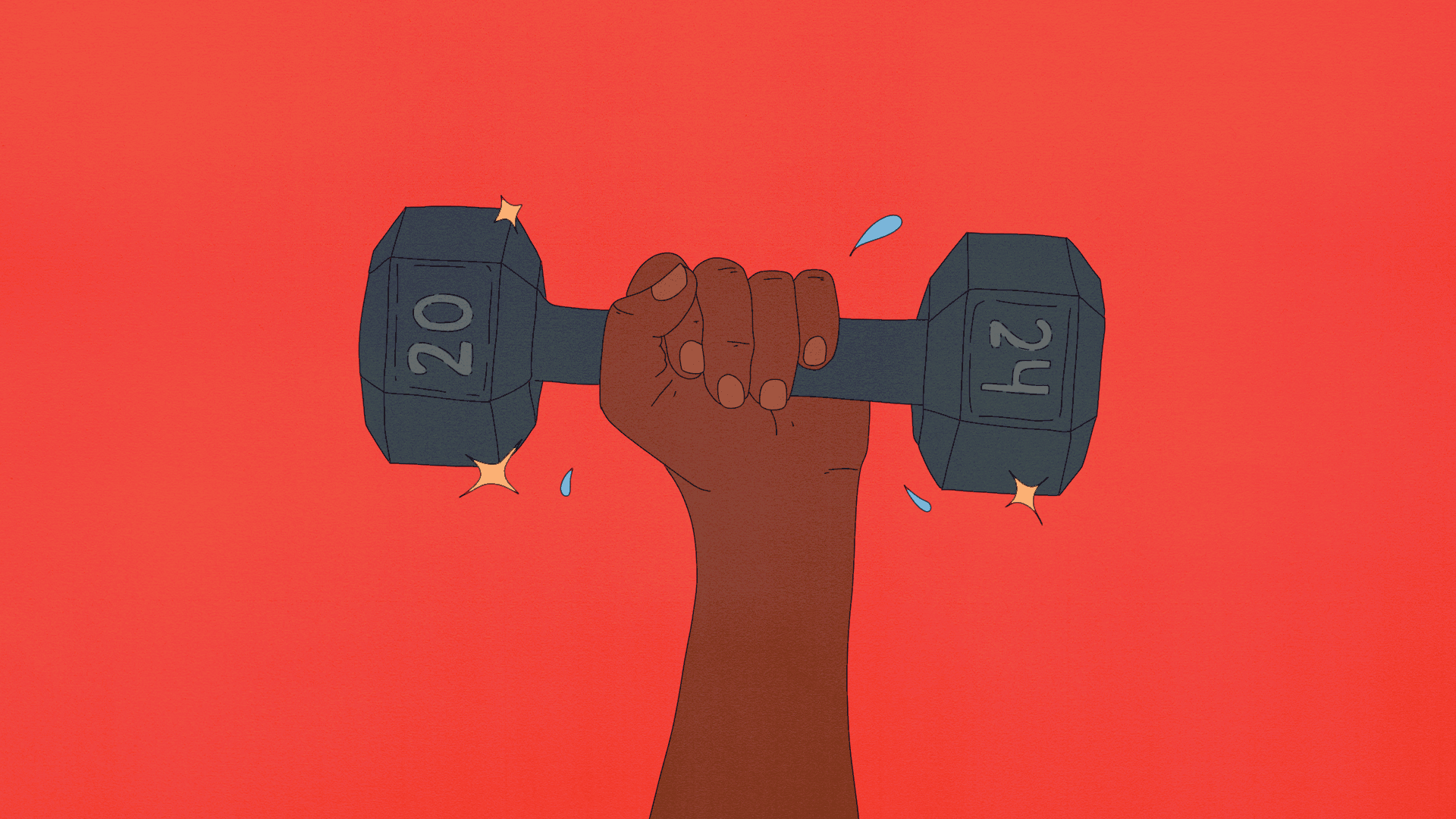The below guide on how to start going to the gym is part of Glamour's 2024 Smart Goals series, which explores reasonable, quantifiable, and—crucially—sane ways to embark on self-improvement objectives you'd like to complete this year. We all know traditional New Year's resolutions are nonsense and designed mainly to make us feel terrible about ourselves and, as a result, spend money on things we think we need to live a more fulfilling life. Here our senior beauty editor digs into how to start going to the gym in order to establish the consistent fitness and overall health goals she's always wanted—not just every January—but hasn't been disciplined enough to actually achieve.
As someone who hasn't ever established a real fitness regimen—I jog sometimes (and occasionally accost strangers about their love lives while doing so) and attend the odd yoga class—my routine has always lacked consistency and discipline. I never make time for working out on a regular basis, and every time I toy with the idea of getting myself a gym membership, I end up putting it off.
It's a fact that going to the gym is both a personal and financial investment, which is easy to create excuses for. My schedule is busy and finding the time and energy is difficult—not to mention a gym membership can be costly. However, I realized that my health has taken a backseat to other obligations—like work and socializing—and I had to start making room for steady exercise. As Glamour's senior beauty editor, I take great care of my exterior with makeup and skin care, but why wasn't I paying attention to how I feel on the inside?
Here's what to expect—including benefits, potential side effects, and what to do in social situations.

Before diving headfirst into the nearest gym, I set intentions and asked myself why I wanted to start working out. For me, it's all about moving my body. I sit hunched over a desk all day, and working out would help me relieve the tension I feel in my back and shoulders. There's also overwhelming evidence that exercise can boost your mood and immune system, two things I struggle with, especially during winter months. Overall, it's clear that the benefits can help me live a happier, healthier life.
However, I couldn't help but feel the “gymtimidation” that creeps in for people who are new to working out. According to Pamelyn Rocco, health and wellness coach and founder of House of Pamelyn, it's normal to feel self-conscious. “It's definitely a real thing, but I can promise you no one is actually paying attention to you,” she tells me. “Isn’t that true with most things in life? We are so worried about what other people think of us, but in reality they aren’t thinking about us at all! In the gym most are only concerned with themselves—they are focused on their own workouts, often listening to music and truly not worried about anyone else.”
Instead reframe your mindset and remind yourself why you are at the gym to begin with. “You’re not there to impress anyone!” says Laura Quinn, nutritionist and head pilates trainer at Alo. “You’re there to work on yourself. Keep your goal in mind. We feel people care about us more than they do. Focus on yourself and block out everyone else.”
Of course, this is easier said than done, so Rocco recommends a few tips for taking off the pressure. “Try going during an off time when there are less people, either super early in the morning or after 8 p.m.,” she says. “Also, don’t be afraid to do a scouting mission to get comfortable with where certain equipment is located and how to use the machines properly.”
Kollins Ezekh, fitness expert and owner of New York–based boxing club Members Only, agrees and adds that it's important to focus on your individual exercise journey. “Remember that everyone starts somewhere,” he says. “Start with less crowded times and focus on your own progress.”
Ahead, fitness experts share everything you need for how to start going to the gym—including where to start, how to stay consistent, and beginner workouts you'll want try ASAP.
Can you really learn how to start going to the gym with no experience?
You don't need to be a pro to start going to the gym. In fact, most experienced gym members had to start somewhere. “The key is to have a plan before walking into a gym,” says Rocco. “I recommend taking a few classes to get a feel for what you enjoy and to gain confidence. Cardio doesn’t take a lot of knowledge or experience and can be a less intimidating place to start.”
Tanya Baker, fitness expert and the creator of the Physique 57 Method, recommends scheduling a tour with a studio or gym membership manager to get acquainted with the space beforehand. “Most offer complimentary training sessions or a special discounted rate for first-time clients,” she adds. “Don't be afraid to ask for help and enjoy the process of improving your health and well-being.”
You can also do research online and find guidance from fitness apps. “There are so many free and paid Alo Moves videos that you can use to guide you through your workouts,” she says. “It can also help to go to the gym with a friend who frequently goes. Whether it involves jumping on the stairs or using the treadmill, the most important thing is to get started. It’s great to push yourself outside your comfort zone. I promise, once you make the gym a habit, it will feel so natural to go.”
What’s the best way to start a gym routine?
Once you've made your plan, it's all about taking that first step. Don't be afraid to use the resources available to you. “Most gyms offer one complimentary training session,” says Rocco. “Take advantage of that and ask for help on how to implement what you learn in your own, independent routine. You can also access online apps and videos to help you with a plan. My House of Health by Pamelyn has a weekly routine with how-to videos to show you proper form and how many reps.”
Setting intentions is important. “Think about what you want to achieve and why,” says Baker. “Do you want to tone and sculpt your muscles? Feel stronger? Improve your flexibility? Lose weight? Or do you simply want to have fun while working out? Having clear goals will definitely help you stay on track and remain consistent.”
You don't have to hit the ground running. Instead, Baker says, start slow and steady with simple exercises that target different muscle groups. “Don't feel rushed or pressured to lift heavy weights or perform advanced exercises right away,” she says. “For example, start with lighter weights and gradually increase the intensity as your strength and confidence grow.”
Most important, listen to your body. “Pay attention to your body and how it responds to exercise,” Baker says. “If something doesn't feel right, don't hesitate to stop and seek advice.”
What’s the best way to keep your gym routine consistent?
Consistency is key if you want to see results. “Not every day or every workout has to be perfect, but showing up and doing the work consistently will give you results,” says Rocco. “I recommend sticking with the same weight training routine for at least 12 weeks at a time. This way, your body can really get the maximum benefit from each exercise because you are focusing on increasing the weight and or reps over time for each movement.” This routine is called progressive overload, which taps into the science behind building muscle. Rocco recommends four strength training workouts per week to get consistent.
“Consistency is often about creating a habit,” says Baker. “Perform your workouts at the same time each day, making them a regular part of your routine until they become second nature.” Ezekh echoes this advice: “Make it a habit. Consistency is best achieved by setting realistic goals, creating a schedule, and finding activities you enjoy.”
Quinn recommends looking ahead to make sure workouts fit your schedule. “I like to plan out my workouts for the week,” she says. “It’s best to find workouts that you love and look forward to, and work with coaches that hold you accountable. Once you pass the two-week mark, it becomes addicting, both mentally and physically. You’ll start to crave it. No one has ever regretted a workout even when they didn’t feel like doing it beforehand. You have my word on that one.”
I did it a decade ago and never looked back. Let's make 2024 the year you do too.

What are recommended gym workouts for beginners?
“Totally depends on what your goals are,” says Quinn. “For losing weight, you’ll want to do the stairs, treadmill, or cardio. For toning, you’ll train with weights or do Pilates. If you want to increase your flexibility, try yoga.” Ezekh encourages full-body workouts: “Exercises like bodyweight squats, lunges, push-ups, and planks are a good starting point,” he says.
Overall, Rocco recommends resistance training for both beginners and advanced gym members. “It's something everyone should be doing regardless of age, weight, and skill level,” she says. “It also requires zero experience to get started. Try finding a resistance training class at your gym to get a feel for how weight lifting feels. And again, utilize those trainers at your gym.”
Ariana Yaptangco is the senior beauty editor at Glamour. Follow her @arianayap.
How to Quit Smoking
How to Start a Podcast
How to Quit Drinking
How to Start a Book
How to Quit a Job
